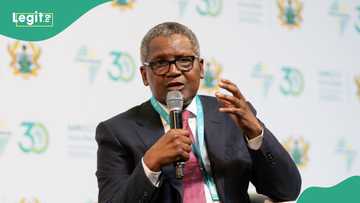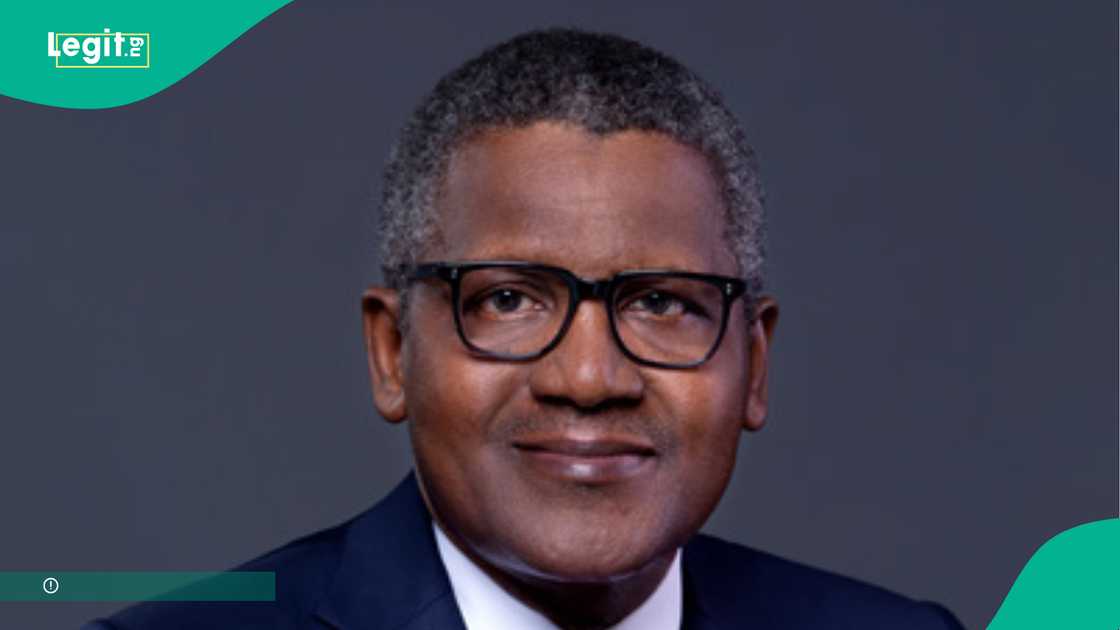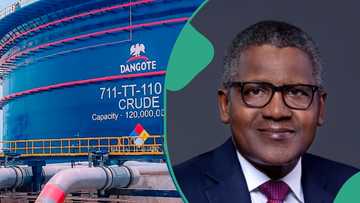Aliko Dangote’s Surprise Resignation From Sugar, Cement Companies Draws Mixed Reactions
- Dangote stepped down as chairman of Dangote Sugar PLC and Dangote Cement PLC to focus on his $20 billion refinery and petrochemical project
- The refinery, which is Africa’s largest, aims to reduce Nigeria’s reliance on imported fuel despite facing several industry challenges
- Stakeholders praised Dangote's move to exit the companies as a sign of strong succession planning and good corporate governance
Legit.ng journalist Victor Enengedi has over a decade's experience covering Energy, MSMEs, Technology, Banking and the Economy.
Nigerians have shared mixed reactions to Aliko Dangote’s decision to step down from leadership roles in two of his companies.
The president of Dangote Industries Limited and Africa’s wealthiest man recently resigned as chairman of both Dangote Sugar PLC and Dangote Cement PLC, creating space for new leadership in these major subsidiaries.

Source: UGC
These resignations occurred within a two-month period, marking a significant shift in Dangote’s direct involvement in the day-to-day operations of the publicly listed firms.

Read also
Refinery and cement push Dangote’s fortune to $29.3bn, gets new ranking among world’s richest
In June 2025, Dangote Sugar PLC announced that Dangote had stepped down after two decades at the helm. His resignation officially took effect on June 16, 2025.
Following a comprehensive selection process, the board appointed Arnold Ekpe, a veteran in the banking sector, as the new Chairman.
Not long after leaving the sugar company, Dangote also relinquished his position at Dangote Cement PLC. Emmanuel Ikazoboh, who previously served as an independent non-executive director, was named as his successor.
Dangote's focus Shifts to $20 billion refinery
Dangote's decision to retire from Dangote Sugar and Dangote Cement is mainly driven by the need to focus on the $20 billion Dangote Petroleum Refinery and Petrochemicals project.
This massive facility, located in the Lekki Free Zone in Ibeju Lekki, Lagos, can process up to 650,000 barrels of oil per day. It is considered the largest refinery in Africa and the biggest single-train refinery in the world.
When production began in January 2024, it marked a major turning point for Nigeria and Africa in reducing dependence on imported fuel.
Despite having four government-owned refineries, Nigeria has relied heavily on fuel imports for years, spending huge amounts of money without getting any output from those refineries.
In an interview with Forbes, Dangote described the refinery as the biggest risk of his life.
He has faced many obstacles, including clashes with powerful figures in the oil industry, often referred to as a “cabal.”
One of the early challenges was a dispute with the Nigerian Midstream and Downstream Petroleum Regulatory Authority (NMDPRA), which questioned the quality of his petrol.
Perhaps the most challenging for the refinery was with the Nigerian National Petroleum Company Limited (NNPCL) over the supply of crude oil.
However, relations have improved under the current NNPCL leadership, which Dangote recently praised for supporting the refinery’s progress.

Read also
Dangote invites Nigerians to apply for jobs, releases link as New CEO plans refinery expansion
What people are saying aboout Dangote's resignation
In an interview with Daily Trust, Adebayo Adeleke, former general secretary of the Independent Shareholders Association of Nigeria (ISAN), said that Aliko Dangote’s decision to step down from two of his companies makes sense.
He said:
“The implication to me is rather positive. It is good one that now in the life of the entrepreneur and the core investor, a very dominant core investor, his stepping aside is a sure sign of succession planning and is also a positive one for corporate governance."
Adeleke said that as a business expands, the founder should focus on key areas and ensure effective leadership succession is in place.
Also sharing his thoughts, Mr. Boniface Okezie praised Dangote’s achievements in the cement and sugar sectors, especially his efforts to make the companies more self-sufficient.
He said:
“For me the refinery is a bigger project for him than Sugar and Cement combined. Also the refinery is also more complex. He had been in cement for decades and in line with the corporate governance principle, he has got people to run the companies for him and that does not take him away from those companies."

Read also
Dangote Refinery’s new CEO, unveils expansion plans to tackle output setbacks and global reach
Even though Dangote is stepping back, Okezie said he is still the owner and visionary behind the companies, and the people managing them are working under his direction.

Source: UGC
Speaking with Legit.ng, Dr. Ifeoma Uzor, a corporate governance analyst, said that Dangote’s exit from his sugar and cement boards signals a mature shift toward strategic leadership.
She said:
"It reflects strong succession planning and enhances investor confidence. Focusing on the refinery, a high-risk, high-impact project, demonstrates vision. This move shows that sustainable businesses outlast individual founders, and it’s a positive development for long-term corporate stability in Nigeria.”
Also reacting to the trending topic, Tunde Olukoyede, a social critic, said that Dangote’s full commitment to the refinery project is a game-changer.
He said:
"His resignation frees him to tackle the enormous operational and political complexities of running Africa’s largest refining facility. It’s a calculated decision that could shift Nigeria from fuel dependency to self-sufficiency. While cement and sugar are stable, the refinery needs his full attention to succeed.”
Dangote Refinery appoints David Bird as CEO
In related news, Legit.ng earlier reported that Dangote Petroleum Refinery and Petrochemicals appointed David Bird, former head of Oman’s Duqum Refinery, as CEO.
The appointment became effective in July 2025 and shows a bold plan by the Dangote conglomerate to solve production hitches.
Since its commissioning in January 2024, the Dangote refinery transformed Nigeria’s fuel supply chain, slashing gasoline imports.
Proofreading by Funmilayo Aremu, copy editor at Legit.ng.
Source: Legit.ng




